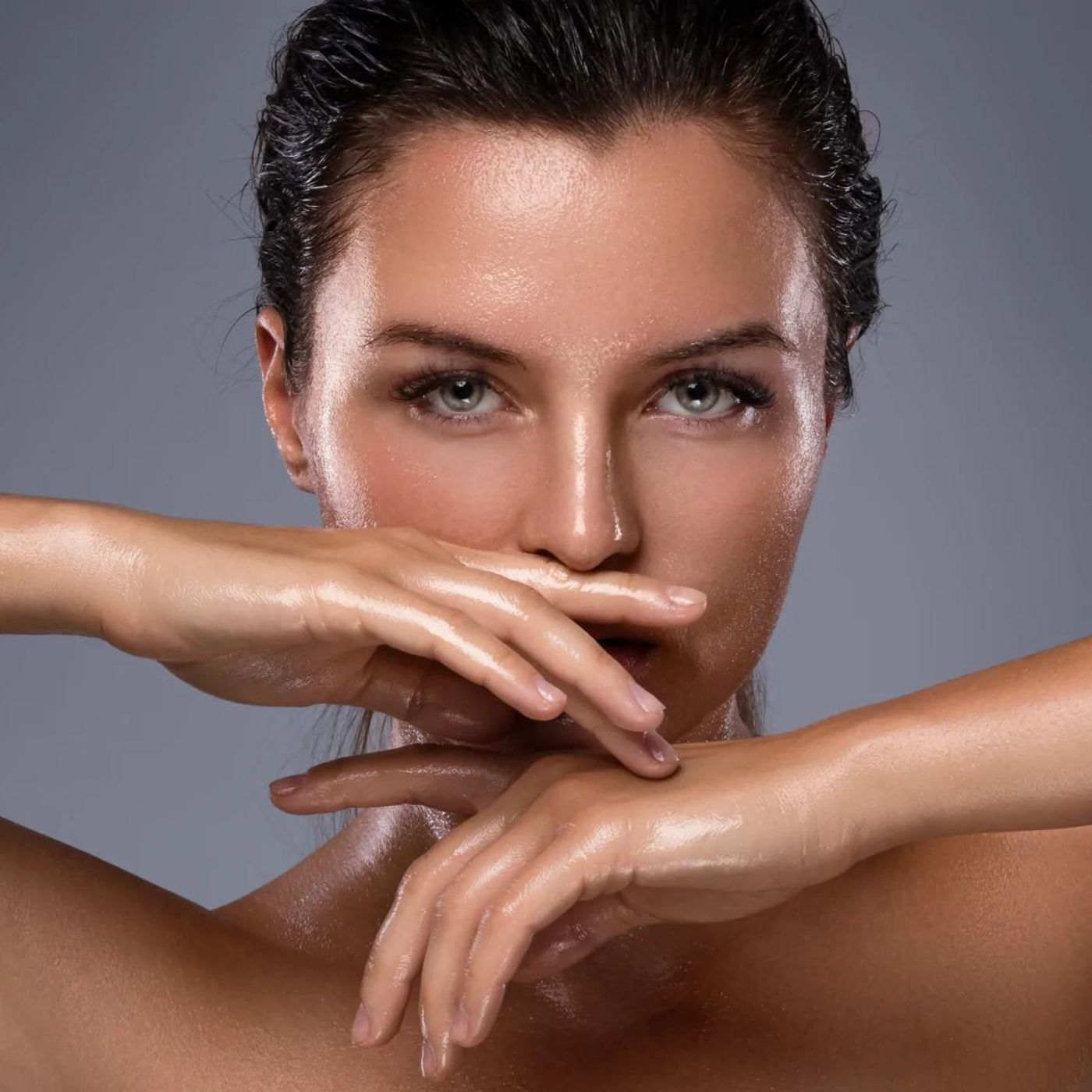
If you are reading this, you probably have oily skin or know someone who does, and you want to know how to get rid of all this excess oil, right? But did you know why we get oily skin?
Why does your skin get so oily?
It is when the sebaceous glands in the skin produce too much sebum, oily skin develops. The waxy, oily material known as sebum contributes to the preservation of the acid mantle, which protects and hydrates the skin.
Sebum is therefore essential for maintaining healthy skin. However, excessive sebum production can result in acne, oily skin, and plugged pores. Making routine skincare a habit is frequently necessary for managing oily skin.
Some main causes of oily skin
-
Environment - Heat and humidity can trigger oily skin types even more!
-
Use of benzoyl peroxide/alcohol-based acne products - These products strip away your natural moisture layer (the acid mantle), which can then trigger your sebum glands into action, thus creating a vicious cycle.
-
Over cleansing/overwashing - Similar to the use of acne products, overly frequent cleansing or washing causes damage to your acid mantle, causing an overproduction of sebum to repair the damage.
-
Hormonal changes - Such as puberty or pregnancy.
-
Stress - When your stress levels are high, your body produces cortisol, which in turn triggers sebum production in your skin.
- Under moisturising - When you have oily skin, you probably feel like you need less, not more, moisturiser! When in fact, skipping moisturiser can contribute to your oily complexion. When you don’t provide your skin with enough hydration, it can trick your skin into producing too much oil.
It is clear that some of these factors, such as hormones and your living environment, are beyond your control. But don't despair; with a few easy adjustments and tips, you can still limit that extra oil production.
Food imbalances
Your gut may be the source of your oily skin problems. Reduce your diet of dairy and sugar, which nourish the body and stimulate oil production. Zinc, magnesium, vitamin B, and omega 3 deficient diets may increase the production of oil.
Additionally, zinc-rich diets assist in regulating the oil glands to improve their behavior. Nuts, legumes, and seafood are excellent sources.
Check out our blog: Science-backed tips: 12 ways your diet can improve your skin
The solutions to oily skin
It can be difficult to prevent oily skin when it results from hormones or genetics. Consistent skin care routines and avoidance of unhealthy diets such as processed foods, fried foods, and foods high in sugar may be beneficial.
It can be tempting to cover up the effects of oily skin with heavy makeup, but doing so can worsen the situation. Reduce your use of cosmetics, especially foundation, when your oily skin flares up.
The effectiveness of a home treatment depends on a number of factors, including your specific situation and the quality of the products you use.
BUT…

Are oil-free products better?
The right answer to this is, it depends.
This is a bit of a gray area and the reason for this is that there are a wide variety of oils available, and they all have unique effects on the skin.
Overall, there isn't much of a cause to be afraid of oils if you do have oily skin. As a proper emollient, oils can help protect the skin from water loss. There is no need to be afraid of oils, even though not all oils may be beneficial for your skin.
Oil-based cosmetics won't harm your skin unless you have a specific sensitivity to a particular kind of oil, but it can significantly alter how you feel about the product.
Other factors can be harder to solve, which is where a good skincare routine comes into play.
Why oil cleansing?
So let’s talk about oil cleansing. Now, oil cleansing may seem like a new kid on the block, but in fact, it has been around for centuries. And it all comes back to the biology of your skin, which is where you should be starting!
Consider the acid mantle which is a very thin, natural protective film that’s made up of sebum (skin oils), amino acids, fatty acids, lactic acid, water (from perspiration), and the skin’s own natural moisture. Its main function is to protect your skin from the elements and nasties like dirt and bacteria, as well as keeping your skin cells firm and hydrated. The acid mantle is also slightly acidic, which means that the use of alkaline-based products, such as foaming cleansers, can destroy the pH balance of the acid mantle.
Once the acid mantle is compromised or stripped away, our sebum glands start producing excess oil in order to repair the acid mantle, thus producing your oily complexion.
So you can see how the use of drying acne products, over-cleansing or overwashing, and the use of alkaline products can contribute to, rather than solve, your oily skin problems.
Things you need to know about oil cleansing
Before you decide to use oil for cleansing your face and skin, you should know that there are some things that you need to take into consideration. While the majority of people who use oils for cleansing haven't experienced any problems, not everyone can do it because of their skin type and other factors such as age, medical condition, medication intake etc.
You may also want to know that when using oil on your face always remember that less is more when it comes to how much oil you will put on your face at once.
Benefits of oil cleansing
There are a lot of people who have tried oil cleansing, and they haven't experienced any problems thanks to its many benefits. Here are just some of them:
1) It moisturizes the skin deeply.
Oil cleansers is a great way to cleanse and moisturize your skin at the same time because of the oil. After using this method you will notice that your face is soft and hydrated, which makes it look and feel much healthier than before you started.
2) It cleanses the pores thoroughly.
If you follow this practice on a daily basis, you will also see improvements in terms of pore cleansing because certain oils can penetrate deep into your pores removing all dirt and bacteria that may be hiding there if left alone for too long. This reduces the chances of having breakouts or blackheads by a significant amount making your skin appear much cleaner than before.
3) It acts as an anti-aging product as well.
The antioxidants found in natural oils are essential for fighting free radicals which damage our skin. Using oils on your face will not only keep it clean and hydrated, because of the presence of antioxidants in them but also prevent wrinkles from appearing too soon.
4) Your makeup will sit better on your face.
Since the oils moisturize, cleanse and tighten up your pores, they can also keep your makeup from sliding off or looking patchy.
5) It prevents acne and other skin conditions.
A lot of people say that their breakouts have reduced significantly since starting to use natural oils as a cleanser. This is mainly because those oils remove bacteria from the face while improving the overall hydration levels so you won't get dry patches whenever you apply some cream or whatever skincare product you prefer to use during the day. Using oils can also reduce the appearance of wrinkles and fine lines, which will make your face look much younger than it actually is.

How to Do Oil Cleansing Correctly
If you want to try oil cleansing but aren't sure what type of oil you should use, don't worry because this article has everything you need to know about it.
1) Choose natural ingredients.
The first thing you must do is make sure that you are choosing natural and preferably organic ingredients for your face cleansing routine, not chemicals or harsh ingredients that can damage the skin. If there are products with natural oils already mixed in them, then they are perfect for this method.
Try our Supercharged Routine for Oily and Acne Prone Skin
2) Do it the night before.
If you want to know how to oil cleanse method step properly, you should always do it at least once a day but preferably in the evening before going to bed. This is especially good for people with oily skin because they can use this method as long as they wish without worrying about any type of bad reaction after several months of using it daily.
3) Use just enough oil for your face.
A few drops of an oil cleanser will go a long way! Use moist hands and rub the oil cleanser between your fingers before massaging all over your face.
Goodieco’s recommendations for oily skin
If you know what Goodieco is about, you will know that natural oils (sebum) for your skin is a good thing.
But we do also know that an overabundance of oil can cause acne and blemishes, which can make you feel self-conscious about your appearance. Excess oily skin gives you that “greasy look” not to mention playing havoc with your makeup.
So we want to find that happy balance between less oil, but by no means dry and dehydrated, right?
Let’s look at just how we can get oily skin and breakouts under control, for good by using our product recommendations. We have created our Supercharged Trio for just this purpose, to help clear and balance oily and breakout-prone skin types.
Our Supercharged Trio (specifically designed for oily and breakout-prone skin) demonstrates how a purifying cleansing oil will work to balance and cleanse an oily complexion. How does this work? Oil dissolves oil. One of the most basic principles of chemistry is that “like dissolves like.”
By using the right oils, you can cleanse your pores of dirt and bacteria naturally, gently and effectively, while replacing the dirty oil with beneficial ones extracted from natural botanicals that heal, protect and nourish your skin. By repairing and replacing the acid mantle in this way, your sebum glands will no longer need to work hard to create oil for your skin's protection.
